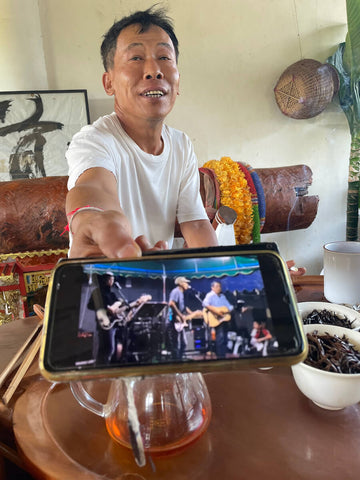“Do you like Assam tea?”
“You also cultivate Assam tea here in Wa Wi?”
“Yes! Northern Thailand’s native tea trees are all Assam.”
“What…….?”
Assam or Pu Erh?
Ban Wa Wi or Wawee is located in northern Thailand, somewhere between Chiang Rai and Chiang Mai in the Doi Chiang (Chiang Mountain) area. Its elevation is about 900-1000 meters. This region is mainly occupied by Chinese refugees from the 60s who were Kuomingtang (the Chinese National Party) at the time and came here in horses by following the Ancient Tea Horse Road in Yun Nan, and a local indigenous group known as Akha people. Nowadays, the second and third Chinese Thai still speak Yunnanese dialect, Chinese and Thai and sometimes, Akha’s dialect as well.


The gate of Wawee village
Akha people naturally were the first that worked with the wild tea trees in this region and they call them “Assam”. It took us a couple of days to understand this Assam doesn’t mean the Assam black tea from Assam region in India, but as Camellia Assamica, which is the tall tree-like tea varietal instead of small tea bushes. Traditionally, Akha people would tie the tea leaves into a bundle and steam them, then they would chew on one leaf taken from the bundle at a time to consume the caffeine from the leaves. This product is known as the “Sour Tea” since the taste of tea leaves is very astringent. When the first generation of Chinese refugees arrived in the region from Yun Nan, some of them came from tea production families and they took an immediate recognition of the Pu Erh tea trees (Assam) in the area. This is the genesis of Wa Wi village, or Cha Fang Cun 茶房村 in Chinese, which means “Tea House Village”. Ahka people nowadays are mostly hired as tea pickers during harvesting season, but some of them also own a smaller scale coffee plantation or tea plantation.

Ahka people picking tea leaves. Image from Google image.
Kasem Liu
Some of these families further recognized the importance of protecting these wild Pu Erh tea trees that were already hundreds of years old. If you look into tea history, you would learn that tea trees used to be a wild plant that originally covered the area of what we know today as Yun Nan, Laos, Myanmar, northern Thailand and northern Vietnam. As Akha people gradually started to chop down these wild trees to meet agricultural demands, some of the Chinese families started to study about these trees' natural habitats and buy small pieces of lands where these trees grow. This is the genesis of Kasem’s family tea plantation.

At the end of tea sampling session on the first day with his new Ruby Black
Kasem is currently the second generation Thai Chinese of his family. When his father came to Wa Wi, he started buying a small piece of land at a time, then eventually was able to piece all the lands together into a forestation (roughly XXX acres) of wild Pu Erh tea trees. Now this legacy has passed to Kasem. Naturally, his family was also one of the very first in the region that advocated for the protection of the wild tea trees and because of their early effort and awareness, their plantation now is one of the largest with wild old bushes from the past in Wa Wi.
An unexpected turn, literally
After what happened with Vick and Emily, we had to quickly pivot and find another source, or the entire sourcing trip would go in waste. As we started to drive around aimlessly on a narrow path that’s off road, we noticed a turn that leads to an even smaller path with some big Pu Erh trees that grow on both sides. We quickly turned to that path and just followed the road without knowing where it was leading, but as the intensity of tea trees increased as we drove in, I had a good gut feeling about this one. Eventually, after climbing a big hill, we saw a few houses that looked like a production and storage facility, then by the end of the road, we saw a big patio and parked our car there. When we got out of the car, we were in a courtyard-like space in front of the production facility with tall tea trees that shoot out randomly from the ground everywhere. As we were admiring the tea trees, Kasem came out and greeted us with a shy smile.

Kasem's production facility from afar in his plantation

The entire forest in the arrow's range is Kasem's tea plantation

Taking a walk at "wild Pu Erh avenue" after the sampling session
We then sat down at his tasting table and began a new tea adventure with him. As we started to get acquainted over his tea, he shared his family history with us and his anecdotes. We then realized Kasem lives up to his name. “Kasem” is a common name in Thai, which means “happiness”. He struck us as a little shy at first, but opened up fairly quickly over tea. He also had us playing guessing the age of his aged raw Pu Erh teas.

Hello 500 year old grandpa Pu Erh tree, still growing strong!
We took a walk together in his tea plantation which is right beneath the huge patio where he usually sun dries his Pu Erh teas. We were really impressed by how well his tea trees were preserved, but we also witnessed how termites were busy climbing up and down the trees biting on them as they did the same to us. Kasem said the biggest challenge for not using pesticide control is insect infestation, mainy termites biting on the roots and causing tea tree death every single year. Even though Wa Wi is located at a relatively higher elevation, unlike the high mountain teas from China or Taiwan, the extreme warm weather during the day makes it a perfect environment for tropical insects. However, the bright side is even though there’s death every year, there’s also new life, new baby tea trees that sprout from random seeds in the area every year. Kasem ambiguously referred to it as the Natural Selection.

Teas and Production
Thanks to Vick and Emily’s teas, by the time I came to Kasem’s tea plantation, I already had a very high standard in mind. When we tried his teas, we immediately recognize their high quality.

A beautiful Pu Erh pick of one bud and two leaves!
Because we arrived just two days before the Qing Ming Festival (the Chinese traditional festival of the Day of the Dead), Kasem had stopped most of his production to prepare for the festival and was sun drying one of the last batches of Before Qing Ming teas on his patio.

The patio where Kasem sun dries his teas

A small batch of tea leaves that were withering on the first day of our visit
We sampled this year's before Qing Ming Pu Erh that was made about one week ago, and found the taste to be very clean, mellow and sweet as well, with an extremely unique taste and a bamboo aroma that grabbed our attention right away. We then continued to sample a few of his aged raw Pu Erhs, Pu Erh white teas and black teas. Even though the fresh Before Qing Ming Pu Erh was still a bit raw, which is quite normal for a just made raw Pu Erh tea, the strength in this tea was speaking out loud. When we tried some of his aged teas later, my theory was confirmed. The aged teas were potent and complex, something you can only come across with good young teas to begin with.
However, the tea that surprised us the most was his Ruby Black tea. Kasem told us that because of the increasing popularity of Thai oolong teas from Mae Salong, some farmers in Wa Wi also imported oolong tea trees from Taiwan and have acquired oolong processing skills from Taiwanese tea masters. He has also started experimenting with oolong tea trees. Currently, he has Ruan Zhi no.17, Jin Xuan no.11, Qing Xin cultivar and oolong no.18 (Ruby Black) in a new plantation area nearby that he bought a few years ago. However, instead of processing oolong no.18 as a traditional Ruby Black from Taiwan, he acquired a different skill set from a tea master in Yun Nan and was able to create his own Ruby Black. It’s a straight up salted caramel tasting tea that is unbelievably sweet, with also a hint of cinnamon spice. We couldn’t possibly understand his secret recipe, but we just couldn’t get enough of it.
Good tea and good memories are all we have taken…
Because of the Qing Ming Festival, Kasem couldn’t spend more days with us or let us document his raw Pu Erh tea’s production after the festival. We were grateful to have caught him right before he left for the festival, and we were more than grateful for our luck after what happened. Before we left, he urged us to go back to visit him soon with a great pity on his face, and he said 'next time when you come back, I will kill a chicken from my tea plantation for you and I will play my guitar while you can sing!’ (Oops..he saw through my fetish of tea mountain chickens, was it that obvious?!)

He was showing us his personal concert from before Covid
Yes, Kasem is also a guitarist who loves doing karaoke in his plantation with his guests.
